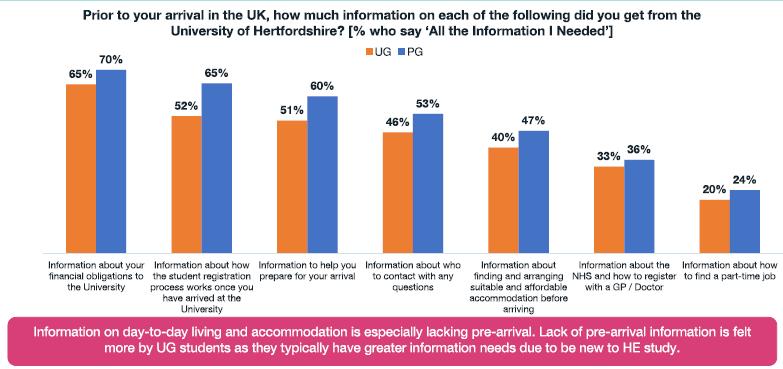International Student Experience 2022





• An online survey was conducted between 20th May – 14th June 2022
• 595 responses received
• Covered agents, accommodation, induction, current experience, HSU, Wellbeing and finances

• 25 online depth qualitative interviews ran between 6th June – 28th June 2022
• Variety of gender, School of study, country of origin and level of study
51% of international students only found suitable accommodation after arriving the UK
• Vital information on accommodation arrangements, financial guidance, travel and FAQ’s often overlooked in bulky emails
• Did not receive enough information on who to contact if they have questions/queries

• Some experienced poor response times
• Many students had to live with family/friends already in the UK while studying
• This was an essential lifeline for many unable to find accommodation prior to arrival



• 77% of International students dissatisfied with their accommodation are dissatisfied with the price
• 63% of International students live in privately rented properties during term-time
• Unable to secure off-campus accommodation
• Struggles to rent privately due to lack of UK guarantor
• Had to choose university accommodation in some cases, though this was less preferred option
• Cost of University Halls is off-putting

• Some opting for twin rooms to reduce costs, but impacts overall satisfaction and experience
• Lack of detail for on-campus accommodation, specifically around bathrooms, laundry etc. perceived to be crucial for those unable to visit in-person
• Local knowledge
• Transport options, local amenities, how to sign up for local GP and NHS services

‘when I arrived, I was starving and didn’t know where to buy food’, ‘Where can I buy adapters for charging all my devices? This was a problem, and I couldn’t find any information’
• Transport upon arrival
• Frequent topic in interviews, many students arriving without knowing how to get to campus, resulting in expensive taxis (£60-80 on average)
‘ I didn’t have a contact number for anyone at the university, so had to get a taxi’, ‘We didn’t know there was airport pick ups’
• Part-Time work
• Crucial for students planning to live off-campus
‘Some of my friends have had to move far away from campus to find part-time work and as a result have a long commute to class.’
- Many preferred to write their application/personal statement in their native language and use the facility of translating to English provided by their Agent.
- Largely used to simplify the application process, finding suitable university, outlining timelines and requirements

‘They offered me a lot of universities in the UK. And we decided to try to apply in University of Hertfordshire. So then they translated all my documents, helped me to take online exams.’

•
• - These students cited they either had family members to assist them, were well-versed in the application process, or were already proficient in English speaking
• UK Education style/essay expectations

• Students often struggle adjusting to UK style of teaching and learning, more emphasis on research, independent thought and debate
• Translates into struggles with writing essays
• Managing responsibilities
• Juggling part-time work and academic work causes issues for students, who feel course leaders are not understanding of this
• Language barriers
• Some found the language barrier difficult especially in complex modules with technical terminology
‘
In class, we couldn’t understand sometimes what they were saying, and the interaction will just decrease the quality of the overall lecture.’



58% of International students’ main reason for not being able to pay fees is related to family emergency
• Some report managing multiple commitments in order to cope financially has vast impacts on their academics, with struggles not recognized or accommodated sufficiently
• Ability to pay for fees is often out of students’ hands
• Family emergencies, unforeseen circumstances and political issues are often reasons for inability to keep up with tuition fees
• Greater understanding and higher visibility of solutions offered wanted
• Knowledge of the Finance team is low and not utilised by many
• Those that did seek support were less likely to receive StudyNet bans
‘Because of a banking policy issue in my home country I couldn’t pay my fees but the finance team ensured I was not locked out of StudyNet.’

